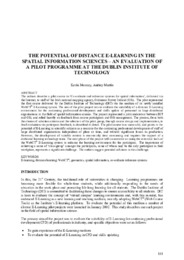The potential of distance e-learning in the Spatial information sciences – an evaluation of a pilot programme at the dublin institute of Technology
Abstract
The authors describe a pilot course in ‘Co-ordinate and reference systems for spatial information’, delivered via the Internet, to staff of the Irish national mapping agency, Ordnance Survey Ireland (OSi). The pilot represented the first course delivered by the Dublin Institute of Technology (DIT) via the medium of its newly installed WebCT® E-Learning system. The aim of the pilot project was to evaluate the suitability of a distance E-Learning environment for the continuing professional development and skills update of personnel in large distributed organisations in the field of spatial information science. The project represented a joint endeavour between DIT and OSi, and relied heavily on feedback from course participants and OSi management. The process, from both the choice of selection criteria and the selection of the pilot group, through course design and implementation, to final evaluation via participant feedback, is described in detail. The pilot course was successful, and points to the potential of E-Learning in scientific subjects as a resource for the continuing professional development of staff of large distributed organisations independent of place or time, and without significant losses in production. However, the development of suitable content is enormously time consuming and requires the support of a dedicated learning technology team. The next phase of the project will concentrate on using the extensive tools of the WebCT® E-Learning system to enhance the learning environment for the participant. The importance of achieving a sense of ‘class-group’ amongst the participants, some of whom may be the only participant in their workplace, represents a significant challenge. The authors suggest potential solutions to this challenge.
